Have you ever felt the comfort of a warm bath after a long day? It’s more than just a cozy moment. Hydrotherapy, or healing with water, has been a trusted remedy for centuries. It helps calm the mind, ease pain, and restore balance.
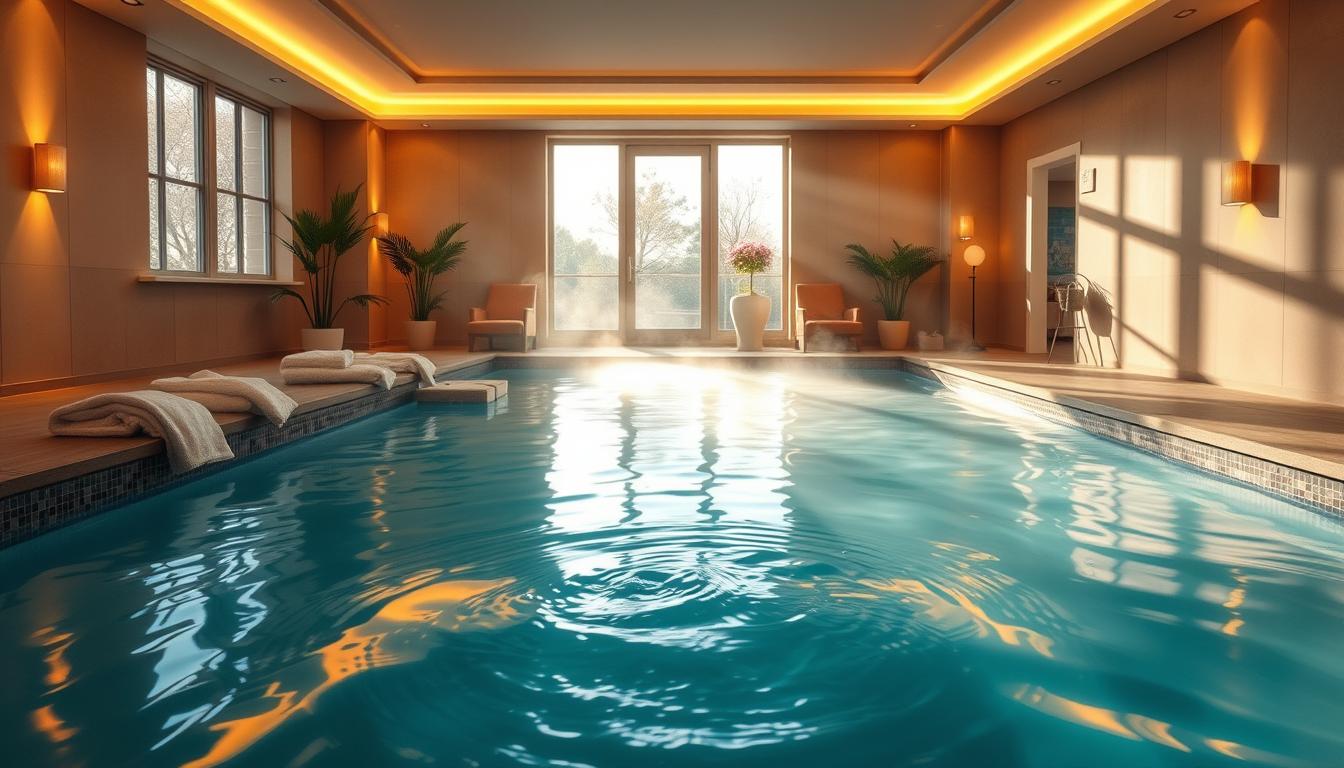
From ancient Roman spas to today’s bathtubs, hydrotherapy has come a long way. It’s now a key part of modern wellness, offering a calming ritual for peaceful relief. Whether you’re stressed, tense, or in physical pain, warm water can be a powerful healer.
Key Takeaways
- Hydrotherapy has been used for therapeutic benefits for centuries.
- Warm baths can calm the mind, ease pain, and restore balance.
- Hydrotherapy has evolved over time, from ancient Roman spas to modern bathtubs.
- It offers a soothing ritual for peaceful relief from stress, tension, and physical discomfort.
- The benefits of hydrotherapy can be a powerful tool for healing.
Understanding Hydrotherapy: Ancient Wisdom for Modern Wellness
Hydrotherapy is a timeless way to find relaxation and relief. It has been used across cultures for centuries.
The Historical Roots of Water Therapy
Water therapy dates back to ancient times. The Greeks and Romans used warm baths for health. Other cultures also adopted this practice. This shows water therapy’s lasting value.
How Hydrotherapy Works in the Body
Hydrotherapy works by relaxing your muscles and improving blood flow. Warm water boosts your body’s healing. It also allows joints to move easier.
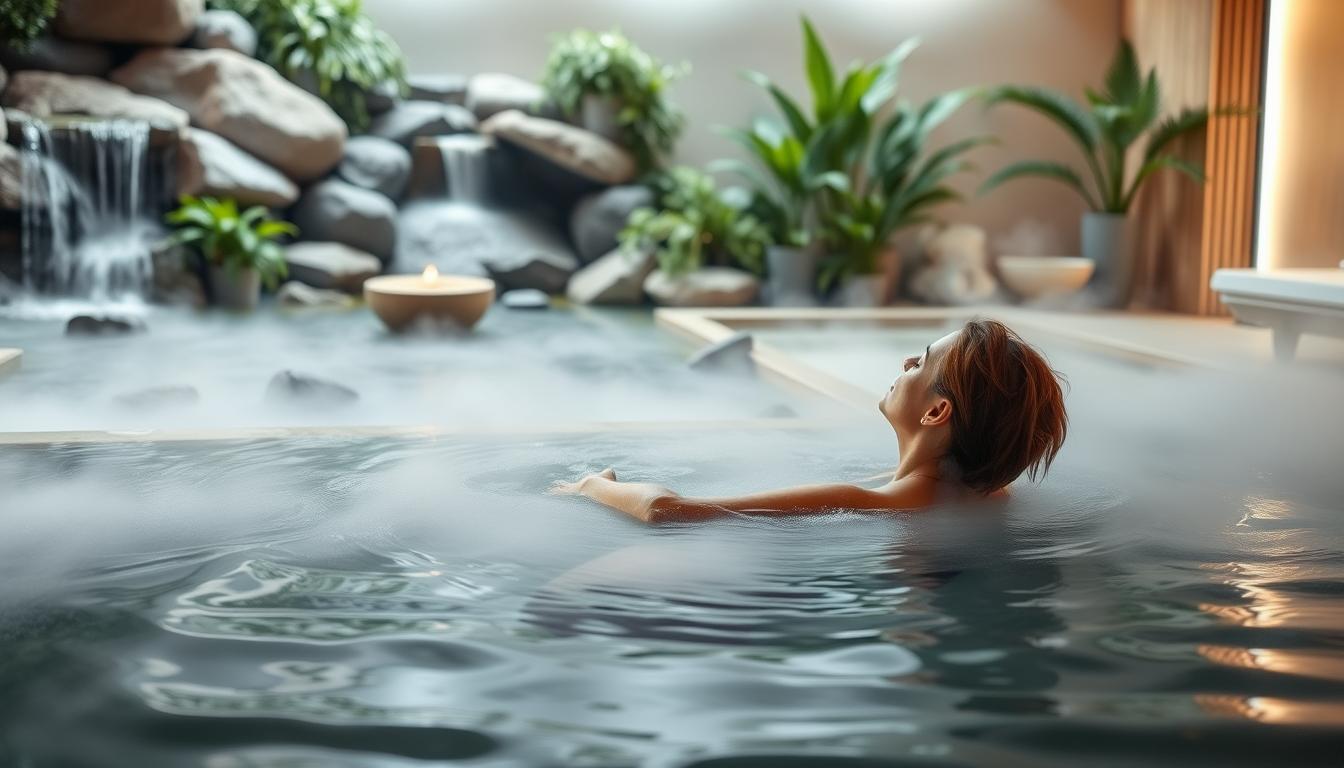
The Healing Effects of Warm Baths and Hydrotherapy
Warm baths and hydrotherapy help you relax and reduce stress. When you soak in warm water, your body relaxes, and your mind calms down
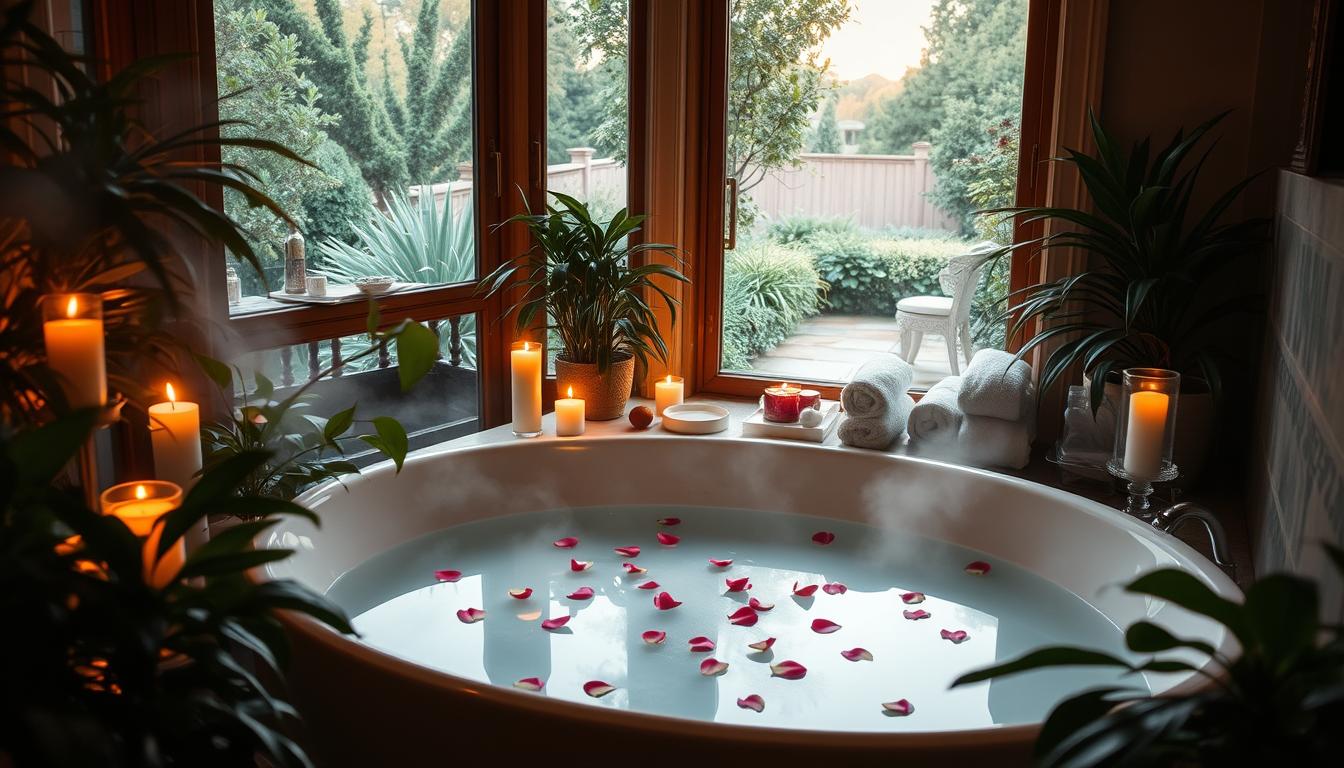
These practices are great for your physical health. Let’s look at some of these benefits.
Physical Benefits: Pain Relief and Improved Circulation
Warm bathroom and hydrotherapy help to relax and reduce stress. The warm water relaxes muscles, reducing pain and swelling. It also makes moving easier and less painful for your joints.
The warm water also makes blood vessels wider, improving blood flow. This helps your body heal faster.
Key physical benefits include:
- Pain relief through muscle relaxation
- Improved circulation due to vasodilation
- Reduced inflammation
Mental and Emotional Benefits: Stress Reduction
Warm baths and hydrotherapy also help your mind and emotions. The calm water and quiet can soothe your mind, lowering stress and anxiety. Regular use can make you feel happier and more balanced.
“The warm water and quiet environment of a hydrotherapy session can be a powerful antidote to the stresses of modern life.”
The Connection Between Water Therapy and Emotional Balance
Hydrotherapy also helps with emotional balance. The deep relaxation from warm water can stabilize your emotions, reducing anxiety and depression. It promotes a calm and balanced state of mind.
Adding warm baths and hydrotherapy to your routine can ease physical pain and improve your emotional state. It’s a great way to take care of yourself.
The Science Behind Water’s Therapeutic Power
Hydrotherapy is based on water’s physical properties and how our bodies react to them. You might wonder how water can deeply affect our well-being. The answer is in how warm water interacts with our nervous system, leading to relaxation and stress reduction.
How Warm Water Soothes Your Nervous System
Dive into warm water and trigger a calm response in the nervous system.. The warmth releases neurotransmitters like serotonin and endorphins, which help us relax. This reduces stress hormones like cortisol, making us feel calmer. The calming effects of warm water are great for those with anxiety or trouble sleeping.
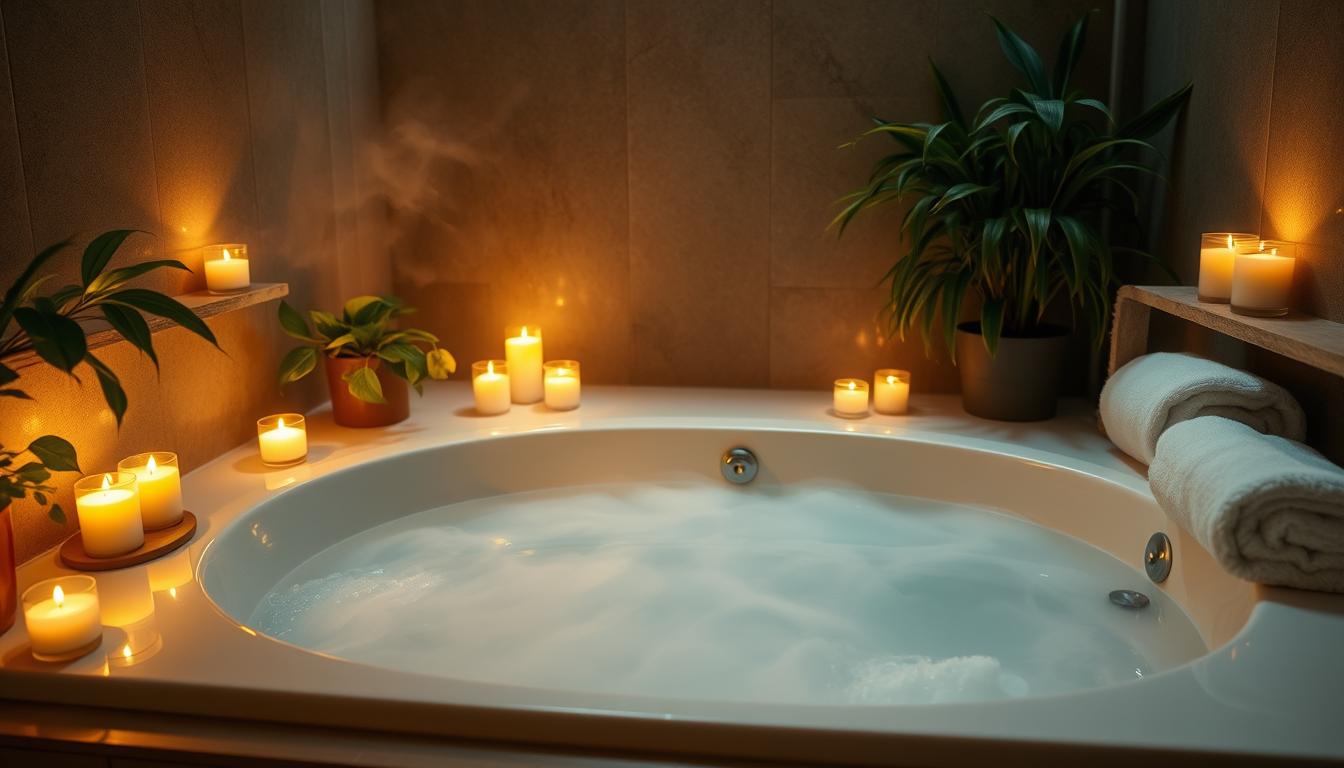
Research and Evidence Supporting Hydrotherapy’s Effectiveness
Many studies have looked into hydrotherapy’s benefits. They show it can relax us, reduce pain, and improve sleep. Regular sessions can lower stress and anxiety, boosting our overall well-being. Adding hydrotherapy for peaceful sleep to your routine can bring these benefits to you.
A study in the Journal of Alternative and Complementary Medicine found hydrotherapy cuts anxiety and depression symptoms. Another study showed it improves sleep quality, making it a good non-medical solution for insomnia.
Exploring Different Hydrotherapy Techniques for Home Use
You can use water’s healing power at home with various hydrotherapy methods. These techniques help with relaxation, stress relief, pain management, and better circulation. They can be customized to meet your specific needs.
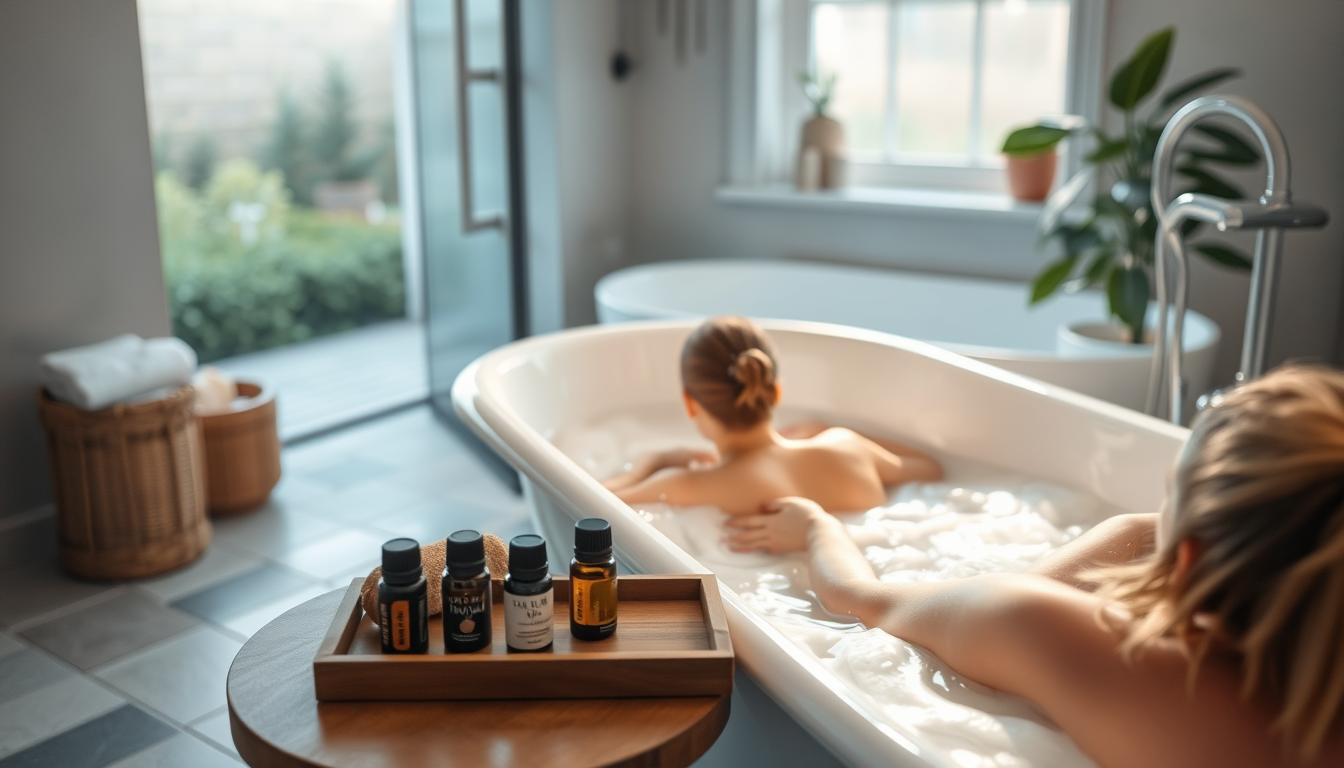
Full-Body Immersion Baths
Full-body immersion baths involve soaking in warm water to relax and ease muscle tension. Adding Epsom salts or essential oils can enhance the experience. This way, you can feel less stressed and improve your overall health.
Contrast Therapy: Alternating Hot and Cold
Contrast therapy uses hot and cold water to boost circulation and immunity. You can use baths, showers, or compresses for this. It helps reduce inflammation and aids in healing, making it a great bath therapy technique for health.
Targeted Therapies: Foot Soaks and Partial Baths
Targeted therapies focus on specific areas of tension or discomfort. Foot soaks can ease fatigue and swelling, while partial baths target hands or lower back. These are great for hydrotherapy for mental health as they’re easy and accessible.
Exploring these hydrotherapy techniques can help you find what works best for you. It can improve your self-care routine and overall health and wellness.
Step-by-Step Guide to Creating Healing Bath Experiences
Turning your bath time into a relaxing escape is easy. Making a healing bath at home is simple and can help you relax and even ease pain.
Essential Oils, Salts, and Herbs for Enhanced Healing
Adding essential oils, salts, and herbs to your bath can make it even better. Essential oils like lavender and chamomile help you relax. Epsom salts can reduce inflammation and ease pain.
Best Combinations for Relaxation
For a calming bath, mix lavender essential oil with dried chamomile flowers. This blend calms your mind and body, getting you ready for sleep.
Best Combinations for Pain Relief
For muscle or joint pain, try a bath with Epsom salts and peppermint essential oil. Epsom salts reduce inflammation, and peppermint oil’s coolness helps ease pain.
Setting Up Your Therapeutic Bath Environment
To get the most from your bath, set up a peaceful space. Dim the lights, play soft music, and keep the water warm. Keeping it calm helps you relax fully.
Healing Bath Recipes for Specific Concerns
Customize your bath for different health needs. Whether you’re recovering from a workout or stressed, there’s a recipe for you.
For Muscle Recovery and Physical Healing
For muscle recovery, mix Epsom salts with arnica oil. This blend reduces muscle soreness and inflammation, perfect for after a workout.
For Anxiety and Mental Stress Relief
To calm your mind, add bergamot essential oil and dried lavender buds to your bath. This mix lowers anxiety and boosts calmness.
Conclusion: Embracing the Peaceful Power of Water Therapy
You can make your self-care routine better by adding relaxing bath rituals. Hydrotherapy for peaceful sleep is easy and works well. Warm water calms your mind and body, helping you sleep better.
Warm baths can be a big part of your wellness routine. They help lower stress and anxiety. They also make you feel better and improve your mood.
To get the most from hydrotherapy, create a calm space. Adjust the lights, play soft music, and use essential oils or bath salts. Making hydrotherapy a regular part of your life can make it more balanced and fulfilling.






GIPHY App Key not set. Please check settings